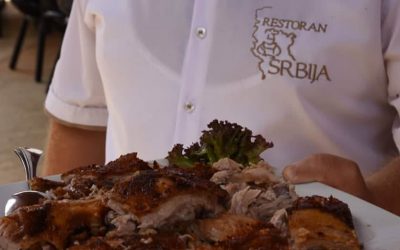Talk about Love in Serbian: 20+ Ready-to-use Love Phrases
If you want to talk about love in Serbian, chances are you got a crush on a Serb. Learn words related to love with their witty etymology, and useful love phrases in Serbian.
If you want to talk about love in Serbian, chances are you got a crush on a Serb. Why wouldn’t you? There is a reason why the Serbs are believed to be among the most handsome men and the most beautiful women in Europe.
Serbian is the language of love, not French. After teaching Serbian to foreigners for so many years, I dare to say that. Why, you ask? Because people usually learn it for their personal connections, for love and affection. You see, nobody learns Serbian because they have to (as is often the case with English or French). Nobody learns it because of work, or visa, or any necessity.
Most students I’ve taught have Serbian partners, relatives or friends. And they learn Serbian because they want to understand them better, become closer to them.
Each person that ever contacted me about learning Serbian was interested in the language because of love – either romantic love with a Serbian partner, or love for Serbia, its friendly people, fascinating language, or rich culture.
How do you say love in Serbian? Ljubav.
In Serbian Cyrillic it’s written: љубав.
The Serbian word for love contains the sound represented by digram lj in the Latin script, or by the letter љ in the Cyrillic script. For non-natives, it’s usually one of the most difficult sounds to pronounce.
To say it right, put the tip of your tongue behind your lower front teeth and stick the middle part of your tongue to your palate and upper front teeth. Then simply say L with the middle part of your tongue, as you let air flow slowly under both sides of your tongue. There, you have it. Ljubav.
How do you say to love in Serbian? Nothing like ljubav.
Maybe you’ve already had this shocking discovery: The noun love is not connected to the verb to love in Serbian. Surprisingly, it shares the root with the verb to kiss in Serbian: ljubiti and poljubiti.
Ja te ljubim or Ljubim te means I kiss you in Serbian.
Poljubi me means kiss me in Serbian.
Želim da te poljubim means I wish to kiss you in Serbian.
Poljubac is a kiss.
Read more about kissing and hugging in Serbia in this article.
To say that we love someone in Serbian, we use the verb voleti.
Da li me voliš? Is how we ask Do you love me in Serbian.
Volim te is how we say I love you in Serbian.
Mnogo te volim means I love you so much.
I ja tebe volim is how we say I love you too in Serbian.
Volim te beskrajno means I love you endlessly.
Voleću te zauvek means I’ll love you forever.
The same verb is used to say that we like doing something. Simply complete the verb voleti with the conjunction da (that) and another verb, conjugated as well. For example:
Volim da čitam. – I like to read.
Volim da učim srpski. – I like studying Serbian.
Volim da putujem. – I like traveling.
However, the obsolete meaning of the verb ljubiti, to kiss, is to love. In many old texts you will translate this verb as to love. Like in the Bible: Ljubi bližnjeg svog kao samog sebe (Love your neighbor as yourself) or in this old song: Ah, kad tebe ljubit ne smem, drugu ljubit neću ja (Oh, since I’m not allowed to love you, I will not love another).
The root of the word love in Serbian is ljub – it’s an old adjective that means loved. Today we don’t use it as such, but it generated many words that we do use.
For example, it’s a part of many names, male (Dragoljub, Miroljub, Ljubomir, Ljubiša) or female (Ljubinka, Ljubica). It gave name to the flower violet (ljubičica) and its color (ljubičasta).
The root ljub- is also a part of many words connected to love
To fall in love in Serbian is zaljubiti se.
The verb is followed by the preposition u and accusative. For example:
Maja se zaljubila u Nikolu – meaning Maja fell in love with Nikola.
Zaljubila sam se u tebe is how you say I fell in love with you, if you’re a woman. A man will say: Zaljubio sam se u tebe – even if they will rarely admit that.
Ja sam zaljubljena (f.) and Ja sam zaljubljen is how we say I’m in love in Serbian. Zaljubljen, zaljubljena is an adjective that means in love in Serbian.
Politeness in Serbian is ljubaznost.
Because politeness is actually just a feigned love towards unknown people. Ljubazan, ljubazna is an adjective that means polite or kind.
Da li biste bili ljubazni da… is how we say Would you be so kind to… in Serbian. But we don’t really use that, unless we want to show restrained anger towards a clerk, for example.
Jealousy in Serbian is ljubomora.
And that’s a witty word. Its meaning is „love torture“. Mora is the feeling of anxiety and pressure that tortures us. Noćna mora means nightmare in Serbian. Ljubomora is love torture – because we’re jealous when we suspect that the one we love loves someone else, and that feeling tears us apart.
Ljubomoran, ljubomorna is an adjective that means jealous, and it’s followed by the preposition na and accusative.
Ja sam ljubomorna na nju means I’m jealous of her in Serbian, if you’re a woman.
A man will say: Ja sam ljubomoran.
Adultery in Serbian is preljuba.
That’s another witty word, because the prefix pre- is often use with the meaning of “transmitting, passing over”. Therefore, preljuba means transmitting love to someone else, to a third person. It’s a formal word – used in court and in the news. It’s often used with the verbs izvršiti (commit) or počiniti (perpetrate). When talking about it, we usually use the word prevara (fraud, deceit) and the verb varati and prevariti, followed by accusative, of course.
On vara ženu means He’s cheating on his wife.
Žena ga je prevarila means His wife cheated on him (once).
Lovers in Serbian are ljubavnik (m) and ljubavnica (f).
But be careful: these words are often used for out of marriage lovers and love affairs. Things to avoid!
Anyway, I hope that you have someone to talk to about love in Serbian – because Serbian is the language of love. Once it gets serious, make sure to read about why you should speak your mother tongue to your children and encourage your partner to do so.
by Magdalena Petrovic Jelic
Founder of Serbonika
Serbian language teacher and entrepreneur, language lover and polyglot, but also a mother and a relentless storyteller. Read more about me.
My mission is to create the best method for learning Serbian. Would you like to learn Serbian with my lessons? Try free.
Serbonika
Najbolja metoda za učenje srpskog jezika
The best method to learn Serbian
The sooner you start learning, the sooner you’ll start talking. Take action now!
Ordering Food in Serbian: Practical Tips to Sound Like a Native
Don’t go to another Serbian restaurant without reading these practical tips about ordering food in Serbian like a native! Avoid “the textbook trap” and stop sounding weird!
Introductions in Serbian: NOT what your book taught you!
Learn how to introduce yourself and to meet others in Serbian language. How to say what’s your name and to ask others about their names.
Speak Serbian like a real Serb! 12 ultimate Serbian phrases no textbook will teach you
Learn Serbian phrases and foreign words used in Serbia you must learn if you want to speak Serbian genuinely like a real Serb.



